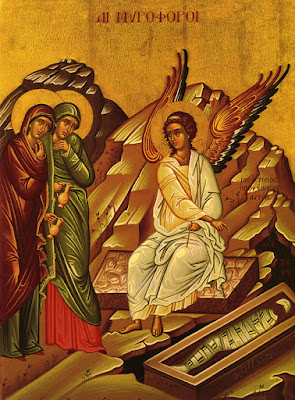In preparation for Pentecost and for a letter I was writing to my home parish, I was praying with the Vespers and Divine Liturgy readings for the feast. My gaze kept coming back to the last line of the reading from Acts, so I took some time to reflect on it: “We hear them speaking in our own tongues the wonderful works of God.” Through this verse, our Bridegroom gently convicted me of a couple things that I’d like to share with you.
First of all, I realized I had never really thought about what the disciples said at Pentecost. I’ve just thought the miracle of each hearing their own language was pretty rad. So, for the first time I noticed what it was the disciples shared: “The wonderful works of God.” I thought about how often, especially recently, I can share my negative experiences, frustrations, complaints, with my sisters and friends much more readily and/or in-depth than the positive experiences, the joys, the good fruits. I thought about the last time pre-Pentecost we know people spoke in a common language, which of course was prior to the “Tower of Babel” shenanigans. But that was a language of pride and self-reliance, of people trying to make gods of themselves. This common language at Pentecost was one of love, of people desiring to glorify God. We are all called to be Christ’s disciples, to accept the gift of the Holy Spirit, and to speak this latter language. We are blessed in our modern society to either speak the same verbal language as most of the people around us, or at least have pretty easy access to Google Translate. But do we take advantage of this gift, and speak of the “wonderful works of God,” or do we abuse the gift and instead have conversations that are anything but uplifting and edifying?
Secondly, I thought about my struggles sometimes in conversing with certain friends or family members. I love them very much but can feel at a loss for words because we just don’t seem to have anything in common anymore. But is that really true? Even beyond the superficial commonalities of sharing a family and memories, aren’t there deeper connections that maybe I’m just not open to seeing? I think all humans struggle, to some extent, with the same wounds. Sure, when I doubt that I’m loved it can cause insecurity in my relationships, whereas when this or that family member doubts that he or she is loved it can cause them to wear a mask of arrogance. But is it not really the same wound of doubting we are loved? I think sometimes the Lord is calling me to speak to that wound (among many others) with people, to be healed together, and together to speak of “the wonderful works of God.” Yet I often am hesitant to “go there,” because it feels awkward or too intense.
I encourage you this day, friends, to take a couple things to prayer. First, ask the Lord to help you be more aware of what ways your conversations and interactions glorify Him and in what ways you need to purify those conversations. And when He shows you the latter, don’t be ashamed or despairing, simply ask Him to help you grow. Also, ask Him if there are people in your life to whom He desires you to reach out, and make an effort to find common ground. I know it’s not always easy to put forth that effort, but when it causes you and others to become more intimate with Christ, I promise it’s worth it. Please pray for me that I may do the same!











